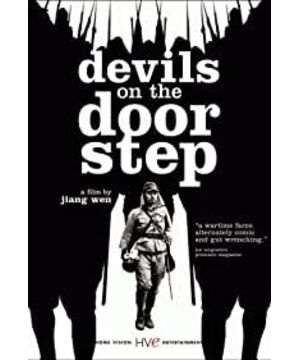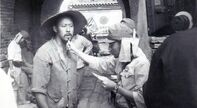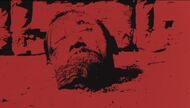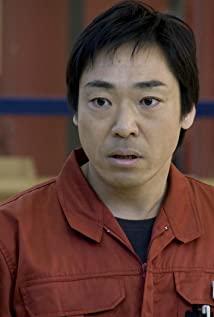Your company's co-production "The Devil Comes" has been reviewed by the Film Censorship Committee. The jury held that: the
film did not modify the script strictly in accordance with the opinions in the Film Bureau's "Approval for the Project Approval of the Co-production Film
There are many foul language in the film, and the "Chinese pig" is repeatedly abused from the mouth of Japanese soldiers. In addition, there are nude scenes of women. The overall style is vulgar and does not meet the standards of the "Film Censorship Regulations".
The title of the film must be re-selected according to the multiple requests of the Film Bureau.
The film must be re-submitted for review after careful revision with reference to the attachments. Attachment: "The main difference between the
film
1. Unauthorized modification and addition of plots lead to serious deviations in the basic idea of the film:
1 , on pages 7 to 8 of the script, in the original literary script, the villagers did not show fear when they tried the Japanese Binghuawu and the traitor Dong Hanchen, and scolded them: "If you want to make a mess, you won't have your sweet pastry to eat," "Adulterated I can make out your yellowness" and so on. The film shows that the villagers were afraid of them from the beginning. And added the line of the 240th Mirror Fifth Uncle: "I think you are all children too", showing the Chinese people as ignorant and ignorant.
2. Regarding the plot of feeding the devils with refined grains, at the stage of the literary script, the film bureau always insisted on deleting it, but the film not only did not delete it, but repeatedly exaggerated that Ma Dasan borrowed Mina from the second batch of Ziniang, and agreed to borrow one and return eight, from the villagers. He also made dumplings for Japanese soldiers and traitors. It objectively shows that the Chinese people during the war took the initiative to care about Japanese soldiers and traitors when their lives were extremely difficult, which seriously violated history.
3. The 1027th shot; compared to the literary script, the film adds two lines of Zi Niang: "The Japanese have been in our village for eight years, what is it, he has been eight years and he dares to touch a single hair of me? I can do it. Right, at the end of the journey, he has to give me a high look wherever I go." The Japanese invaders burned, killed and looted in China for eight years, committing heinous crimes, but the film uses the words of a second batch of children to say that the Japanese army did nothing to him. , glorified the Japanese invaders.
4. From the 472nd shot to the 496th shot, compared to the original script, the film adds a section of the Japanese soldier Hanaya imagining Ma Dasan and the villagers rushing over, and designed Ma Dasan and the villagers to look like Japanese samurai. In the context of the Anti-Japanese War, the Japanese soldiers Hanaya feared most were the anti-Japanese troops, the Eighth Route Army and the guerrillas. The plot that Ma Dasan and his villagers were designed to be Japanese warriors was not only false, but also vilified the Chinese.
5. Shots 877 to 893, shots 918 to 931, shots 941 to 947, shots 954 to 959, compared to the original script, the villagers thought that Ma Dasan killed the devil and ignored him , even the fish avoided him, which stimulated Ma Dasan's nerves. It shows that many Chinese people do not have due hatred for the Japanese army, and even the enemy is indistinguishable, ignorant and numb.
6, 1002 shots to 1069 shots; compared to the original script, the film added the danger of children learning Japanese, and the villagers became angry with Ma Dasan, one by one vying for him to kill himself and put his head on the table; fish The second said to the villagers: "Let him kill people, wouldn't that make me have a ghost... Look at these two days, who of you has paid attention to him... Don't kill people, force us to kill people, kill people, and ignore us again, see you Ma Dasan is like seeing a ghost, the people are not dead, and we are doing this again..." It shows that the Chinese people not only dare not resist the enemy, but are also full of servility and fear of the invaders, only fighting in their own nests and suspicious of each other. .
7. Page 34 of the script: In the original script, when Liu Dao Liu talked about his killing skills, he was talking about killing an eunuch who cheated on him. However, from scenes 1177 to 1199 in the film, the one who killed Liu Dao Dao was "the eight ministers around Cixi". , "Tan Sitong, Lord of the Hundred Days of Reform", not only gave new political connotations, but also proudly exaggerated the skills of beheading. As a result, he failed in killing Japanese soldiers. . It gives people a metaphor that for thousands of years the Chinese have only raised their butcher knives to kill their own people, but have not dared to resist foreign aggression.
8. On page 39 of the script, everyone discussed sending the devils back. In the original literary script, it was described that the Japanese army arrived in the village, sprinkled rice into a circle, surrounded the people, forced them to eat, and put their heads in their mouths if they couldn't eat them. Sai, when the Japanese army commander spoke, the people ignored him. From the 1763rd shot to the 1871st shot of the film, the scene was changed to a party, and vigorously exaggerated, drinking and singing together, the people were grateful, the Japanese army and the villagers were as close as brothers, and there was a saying "I am happy today, not just rushing here. A few cartons of food, mainly because the imperial army gave us face" and other lines, this is a major change to the script's conception, and it fundamentally deviates from the theme.
10. Pages 47 to 49 of the script; the scene of the massacre of the villagers. In the original literary script, there is a description of the people finally awakening and rising up to resist, such as Erbu picking up a steel helmet and smashing it at the Japanese soldiers, Erbu Ziniang took off her shoes to beat the devil, and shouted. Said: "Don't be stupid, copy the guy and spell it." However, from the 1872nd shot to the 2073rd shot of the film, the people did not fight the devils until they died. In the face of massacres, they basically waited to die and were slaughtered by others.
11. The only person in the film who dares to scold and resist the Japanese invaders is a lunatic who makes the villagers dislike it.
12. Compared with the literary script, the film added the scene of the Kuomintang generals convening a gathering of the people. He publicly executed the traitor and delivered a speech on surrender. In his speech, he said: "Only the national army is the only legitimate recipient of the surrender of the Japanese army." And borrowed the Japanese The hand kills Ma Dasan. However, all these behaviors that reversed the facts were echoed by the onlookers, which seriously distorted history and did not achieve the effect of criticizing and satirizing the Kuomintang.
13. There are two characters who sing ditty songs in the film, and they appear three times in total. There is no such description in the original literary script. Shot No. 1099 "The Imperial Army came to our hometown to build the Greater East Asia Co-Prosperity Sphere, and the Imperial Army came to save the suffering..." The lines also increased. This is a typical image of ignorance, numbness, and a subjugated slave.
14. Crazy Old Seven's words scolding Junior and Yu'er have the same content as scolding Japanese devils, which is very inappropriate.
15. Many places in the film use the mouths of the Japanese to insult Chinese people as "Chinese pigs", which seriously damages China's image.
2. Comments on revisions were proposed in the script approval, but the film did not change:
1. Page 2 of the script: Nonomura put the sugar back in his pocket after changing the trick to show that the Japanese army was playing tricks on the children. In the 24th shot of the current film, not only the candy was given, but it was also shown several times that Chinese children were chasing behind the Japanese army for candy.
2. Page 2 of the script: Ma Dasan and Yu'er's violent gasps on the bed, and the nude scene of Yu'er The original literary script has been deleted. The 28th to 41st scenes of the film are not only not deleted, but also added lines: "Let me see." "What are you looking at, hurry up, don't rest." This bed scene took a long time, and the picture and sound effects were strong. Causes strong negative sensory stimulation.
3. Page 40 of the script: The donkey is in heat. In the original literary script, it has been changed to the donkey burrowing into the devil's granary. Shots 1590 to 1606 of the current film have not been modified. The plot is cheesy and boring.
4. Most of the swear words have been deleted from the original literary script, but they are everywhere in the film, and every character is swearing.
5. The frequent playing of Japanese military songs in the film to promote Japanese militarism will seriously hurt the feelings of the Chinese people.
View more about Devils on the Doorstep reviews










